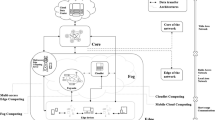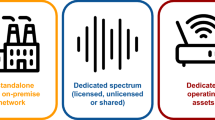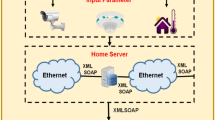Abstract
In this study, we investigate the edge offloading of sensory data in the internet of things. Multiple edge servers cooperatively offloading all or part of the sensory data initially sent to a cloud center, which improves users’ experience. In the process of cooperative offloading, the transmission of sensory data and information exchange among edge servers will consume system resources, resulting in a cost of cooperation. How to maximize the offloading ratio of sensing data while maintaining a low collaboration cost is a challenge. This study first formulates a joint optimization problem of the sensing data offloading ratio and cooperative ratio satisfying the constraints of network delay and system energy consumption. Subsequently, a distributed alternating direction method of multipliers (ADMM) via constraint projection and variable splitting is proposed to solve the problem. The numerical results show that the proposed method greatly improves network delay and energy consumption compared to the fairness cooperation algorithm.







Similar content being viewed by others
References
Pan, J., & McElhannon, J. (2017). Future edge cloud and edge computing for internet of things applications. IEEE Internet of Things Journal, 5(1), 439–449.
Jia, G., Han, G., Rao, H., & Shu, L. (2017). Edge computing-based intelligent manhole cover management system for smart cities. IEEE Internet of Things Journal, 5(3), 1648–1656.
Satyanarayanan, M. (2017). The emergence of edge computing. Computer, 50(1), 30–39.
Chen, M., Challita, U., Saad, W., Yin, C., & Debbah, M. Machine learning for wireless networks with artificial intelligence: A tutorial on neural networks. arXiv:1710.02913.
Du, J., Zhao, L., Feng, J., & Chu, X. (2017). Computation offloading and resource allocation in mixed fog/cloud computing systems with min–max fairness guarantee. IEEE Transactions on Communications, 66(4), 1594–1608.
Liu, C.-F., Bennis, M., Debbah, M., & Poor, H. V. (2019). Dynamic task offloading and resource allocation for ultra-reliable low-latency edge computing. IEEE Transactions on Communications, 67(6), 4132–4150.
Wang, K., Yin, H., Quan, W., & Min, G. (2018). Enabling collaborative edge computing for software defined vehicular networks. IEEE Network, 32(5), 112–117.
Sahni, Y., Cao, J., Yang, L., & Ji, Y. (2020). Multi-hop multi-task partial computation offloading in collaborative edge computing. IEEE Transactions on Parallel and Distributed Systems, 32(5), 1133–1145.
Deng, S., Zhang, C., Li, C., Yin, J., Dustdar, S., & Zomaya, A. Y. (2021). Burst load evacuation based on dispatching and scheduling in distributed edge networks. IEEE Transactions on Parallel and Distributed Systems, 32(8), 1918–1932.
Chi, G., Wang, Y., Liu, X., & Qiu, Y. (2018). Latency-optimal task offloading for mobile-edge computing system in 5g heterogeneous networks. In 2018, IEEE 87th Vehicular Technology Conference (VTC Spring). IEEE, (pp. 1–5).
Ren, J., Yu, G., Cai, Y., & He, Y. (2018). Latency optimization for resource allocation in mobile-edge computation offloading. IEEE Transactions on Wireless Communications, 17(8), 5506–5519.
Xiao, Y., & Krunz, M. (2017). Qoe and power efficiency tradeoff for fog computing networks with fog node cooperation. In IEEE INFOCOM 2017-IEEE Conference on Computer Communications. IEEE (pp. 1–9).
Yuan, P., Shao, S., Geng, L., & Zhao, X. (2021). Caching hit ratio maximization in mobile edge computing with node cooperation. Computer Networks, 200, 108507.
Wang, Q., & Chen, S. (2020). Latency-minimum offloading decision and resource allocation for fog-enabled internet of things networks. Transactions on Emerging Telecommunications Technologies, 31(12), e3880.
Xing, H., Liu, L., Xu, J., & Nallanathan, A. (2018). Joint task assignment and wireless resource allocation for cooperative mobile-edge computing. In 2018 IEEE International Conference on Communications (ICC). IEEE (pp. 1–6).
Chen, M., & Hao, Y. (2018). Task offloading for mobile edge computing in software defined ultra-dense network. IEEE Journal on Selected Areas in Communications, 36(3), 587–597.
Vu, T. T., Nguyen, D. N., Hoang, D. T., Dutkiewicz, E., & Nguyen, T. V. (2021). Optimal energy efficiency with delay constraints for multi-layer cooperative fog computing networks. IEEE Transactions on Communications, 69(6), 3911–3929.
Huang, X., Cui, Y., Chen, Q., & Zhang, J. (2020). Joint task offloading and qos-aware resource allocation in fog-enabled internet-of-things networks. IEEE Internet of Things Journal, 7(8), 7194–7206.
Lan, X., Cai, L., & Chen, Q. (2019). Execution latency and energy consumption tradeoff in mobile-edge computing systems. In 2019 IEEE/CIC International Conference on Communications in China (ICCC). IEEE (pp. 123–128).
Dong, Y., Guo, S., Liu, J., & Yang, Y. (2019). Energy-efficient fair cooperation fog computing in mobile edge networks for smart city. IEEE Internet of Things Journal, 6(5), 7543–7554.
Funding
This study was funded in part by the National Natural Science Foundation of China (62072159, U1804164 and 61902112), in part by the Science and Technology Foundation of Henan Educational Committee (19A510015, 20A520019 and 20A520020).
Author information
Authors and Affiliations
Corresponding author
Ethics declarations
Conflict of interest
Author A declares that he has no conflict of interest. Author B declares that he has no conflict of interest. Author C declares that she has no conflict of interest. Author D declares that she has no conflict of interest.
Ethical approval
This article does not contain any studies with human participants or animals performed by any of the authors.
Additional information
Publisher's Note
Springer Nature remains neutral with regard to jurisdictional claims in published maps and institutional affiliations.
Rights and permissions
Springer Nature or its licensor (e.g. a society or other partner) holds exclusive rights to this article under a publishing agreement with the author(s) or other rightsholder(s); author self-archiving of the accepted manuscript version of this article is solely governed by the terms of such publishing agreement and applicable law.
About this article
Cite this article
Yuan, P., Shao, S., Zhang, J. et al. Cooperative edge offloading strategy for sensory data with delay and energy constraints. Wireless Netw 29, 3469–3478 (2023). https://doi.org/10.1007/s11276-023-03404-7
Accepted:
Published:
Issue Date:
DOI: https://doi.org/10.1007/s11276-023-03404-7




